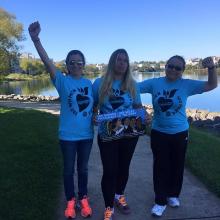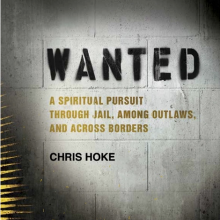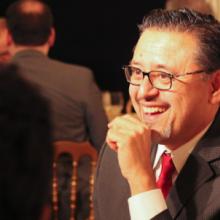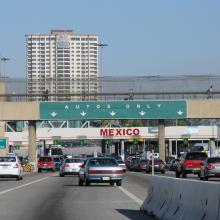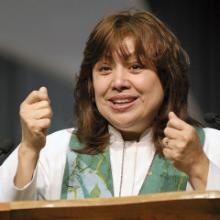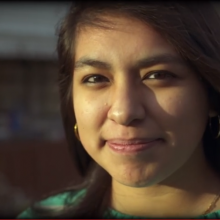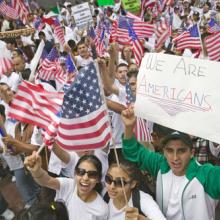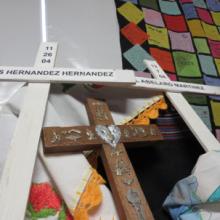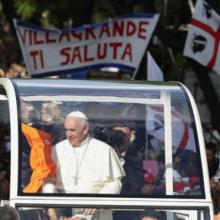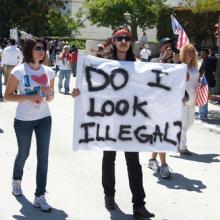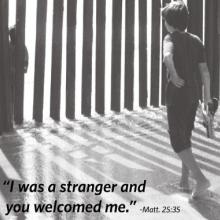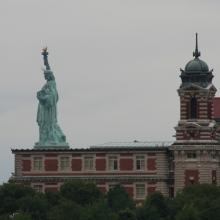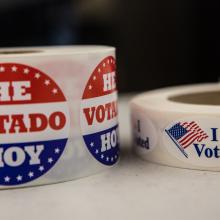immigrants
January 1 marked the 124th anniversary of the opening of Ellis Island. Years later, in 1916, the immigrant inspection station was opened. Over the course of 60 years, more than 12 million immigrants came through the island.
Almost all of my great-grandparents were among that number, although, according to a sister who has been researching our history on ancestry.com, we can’t find any records. A fire destroyed the original station in 1897. It’s likely that our family’s records went up in flames with so many others’. Although — like many New Yorkers — I’ve never been there (who really has the time to schlep over there except tourists or class trips?), the island looms large in our collective self-understanding. Yes, we are Americans, but for us “American” meant “immigrant.”
“In cities and towns across the country, women will walk for one mile on the 11th of each month for 11 months. Together we’ll walk another 100 miles for the 11 million undocumented immigrants in the United States.”
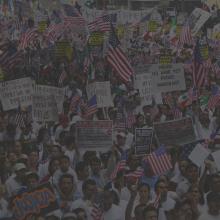
Image via Joseph Sohm/Shutterstock.com
On their first day in office, newly elected members of the U.S. House of Representatives take an oath on the House floor — to “support and defend the Constitution of the United States.”
But before his election as Speaker of the House, Rep. Paul Ryan took another oath — this time to the so-called “Freedom Caucus,” a group of several dozen overwhelmingly white, conservative Congressmen from overwhelmingly white, conservative congressional districts.
Specifically, reports the National Review, the oath “extracts Ryan’s word that he will not bring up comprehensive immigration reform ‘so long as Barack Obama is president’ and, as speaker, even in the future, Ryan will not allow any immigration bill to reach the floor for a vote unless a ‘majority’ of GOP members support it.”
In short, in order to become the new speaker of the House, Ryan has vowed to block immigration reform from coming to a vote until January 2017 — at the earliest.
This is the second time Ryan has made a pledge on immigration reform. I remember the first: in 2014, Ryan called me at the Sojourners office, offering to help Christians pass comprehensive immigration reform. That led to meetings in Ryan’s office with key evangelical leaders about how to do that strategically, with Ryan telling us that the “evangelical factor” on immigration reform was something he had never seen before.
He promised us on several occasions that he would help bring immigration reform bills to the floor of the House. Many other Republicans promised the same thing to evangelical pastors who came to visit them from their districts.

Photo via YouTube / Associated Press
Jesus said, “Let the little children come to me, and do not stop them; for it is to such as these that the kingdom of heaven belongs.”
Pope Francis paraded through Washington D.C., on Sept. 23, and took Jesus’ words literally.
After Francis’ security detachment turned away a young girl who had gotten over the barricade fence to greet him, he quickly called her over for a blessing.
Pope Francis on Wednesday said people who shut out refugees should seek forgiveness, after clashes on Italy’s borders as European countries try to push back against a wave of migrants fleeing by boat from Libya.
Addressing crowds in St. Peter’s Square, Francis drew his followers’ attention to the U.N.’s World Refugee Day this Saturday.
Wanted: A Spiritual Pursuit Through Jail, Among Outlaws, and Across Borders is non-fiction, but I read it like it was one of the latest blockbuster novels, this time with gorgeous writing. I couldn’t put it down, and I didn’t want the journey to end, following Chris Hoke through jails and streams and farms of Washington’s Skagit Valley as he grew from a young man interested in faith outside the walls of the church to a pastor to the “homies” of the area, as they called themselves—men whose criminal past or undocumented status have caused them to be among the most marginalized in our society. This book is imbued with dignity, prayer, and an understanding that relationships require forgiveness, on both sides. Wanted is a beautiful reflection on what the life of faith looks like in action.
Hoke grew up in southern California but was drawn to the dimmer corners of the Christian faith. He made his way to northwest Washington state to work with Tierra Nueva, a ministry that “seeks to share the good news of God’s freedom in Jesus Christ with people on the margins (immigrant, inmates, ex-offenders, the homeless).” We recently chatted about his work with Tierra Nueva, the value of a good metaphor, and how reading the Scriptures in prison can make them new.
An alliance of evangelical organizations has pledged to dramatically increase the number of church-based legal clinics across the country to assist immigrants with the complicated processes of seeking green cards, visas and family unification.
The Immigration Alliance, a network of 15 evangelical denominations and ministries, on Oct. 21 launched a plan to reduce the gap between the 22 million immigrant noncitizens and the 12,000 private immigration lawyers in the country.
“Churches are a trusted presence in immigrant communities that can — and should — help address this critical shortage of legal services,” said Noel Castellanos, the alliance’s board chair and the CEO of the Christian Community Development Association, in announcing the new venture.
The alliance, which was formed in 2013, estimates that there also are 2,800 nonprofit attorneys and accredited staff in the country. The umbrella network includes the National Association of Evangelicals, the Assemblies of God, the Church of the Nazarene and the National Latino Evangelical Coalition, among others.
[Gilberto] shared about the man who had been deported at 51 years old after living in the U.S. for 50 years. Because this man’s parents came to the U.S. when he was 6 months old, he knew no other home than that of the U.S. When he landed in Tijuana, it not only felt like a foreign land, but he didn’t even know Spanish.
He shared about the U.S. military veteran who served in Iraq and Afghanistan but after serving his time in war zones, was deported to Mexico.
He shared about the man who had recently been deported and was now desperately trying to return to his wife and young children in the U.S.
With each story, the layers of isolation, dehumanization, and misunderstanding began to be peeled back. We had all heard the stories of deportation in the headlines, but none of us had come face to face with the humans behind the story.
Mesmerized by this sage who cast such a strong aroma of Jesus, we asked, “What would you encourage us to say to our congregations regarding the plight of the immigrant?”
He quickly responded with words I’ll never forget:
“Tell them to read their Bibles. Jesus told us to care for three types of people: the orphan, the widow, and the stranger. It’s been 2,000 years and we’re still doing a pretty bad job.”
Religious leaders urged President Obama and Congress to provide funding for legal assistance to unaccompanied migrant children who are in U.S. custody after fleeing violence, murder, and extortion abroad.
Multiple speakers, including United Methodist Bishop Minerva Carcano and the Rev. David Vasquez, spokesman for the Lutheran Immigration and Refugee Service, took part in a national teleconference Thursday. They then sent a petition signed by more than 3,800 people to Congress.
The people we meet change our lives. Through hearing the stories and learning about the lives of others, we are transformed. And, it is for exactly those reasons that I hope you’ll watch this short trailer and sign up to be one of the first people to watch The Stranger.
The Stranger is a new 40-minute documentary created to introduce Christians to the stories and lives of immigrants living in this country. Interviews with pastors, Christian leaders, and policy experts provide a biblically based context for the immigration challenges that face our country today. The film, commissioned by the Evangelical Immigration Table, was produced by Emmy-award winning producer Linda Midgett.
I’m a white southerner, ordained Baptist, and have built a career over the past decade working on a broad spectrum of projects in the civic sector. In that time I’ve been blessed to lead and work on some of the most prominent issues of social change throughout the globe. Whether it was working on funding for our veterans, organs for kids who need transplants, better schools and public transit, justice for Trayvon Martin, freedom for the Wilmington 10, or on political campaigns — I’ve had the opportunity to help grow and lead some of our nation’s largest and most vital organizations. Now, inspired by those in our generation who choose to dream instead of choosing despair, I’ve stepped out on faith to join the immigration reform movement. I hope you’ll pledge to join it as well.
Ah, Christmas! The most wonderful time of the year. A time to gather with family and friends, and, with a smile on our faces, pretend we aren’t quietly measuring who received the best present and which relative really, really needs to stop drinking. A time to hang tinsel and baubles from the tree, and a time to hang up our hopes of losing that last 10 pounds this year. Such a joyous season!
The real point here is that Christmas is what we make of it. For Christians, however, there are some very specific things you can’t do if you want to actually honor and follow the person we celebrate this season. So, I give you my “10 Things You Can’t Do AT CHRISTMAS While Following Jesus.” As with my other “10 Things” lists, this is not intended to be a complete list, but it is a pretty good start.
As an icy wind whipped the sides of a packed tent, five activists committed themselves Tuesday to fast from food and drink and to camp in front of the U.S. Capitol until Congress passes comprehensive immigration reform.
“I know that there are going to be difficult days ahead of me,” said Eliseo Medina from the Service Employees International Union. “I know that going without food will not be easy and I know that I will suffer physical hunger."
“But there is a deeper hunger within me, a hunger for an end to a system that creates such misery among those who come here to escape poverty and violence in search of the American dream.”
Religious and labor leaders joined immigration activists at the launch of the “Fast for Families: A Call for Immigration Reform and Citizenship.” Many will participate as “solidarity fasters,” fasting for a shorter time.
Pope Francis criticized what he called the “idolatry of money” on Sunday in a trip to one of the poorest regions of the European Union.
The pontiff, visiting the island of Sardinia off Italy’s western coast, departed from his prepared remarks to talk about his own family’s struggles as Italian immigrants in Argentina. Speaking on an island where more than half of workers under 30 are unemployed, Francis told the masses: “Don’t let yourselves be robbed of hope.”
Editor's Note: In April, Associated Press representatives said they would no longer recommend the term "illegal immigrant" in the influential AP Style Guide used by many in print media. However, the term is still used by many media outlets and in common parlance. Our hope is that more will follow the AP's lead and rethink its usage.
As the Senate recently passed long awaited immigration overhaul and the bill now heads to the House, the long-standing national discourse on the issue of immigration will likely heat up again. As we participate in these discussions, my hope is that we, especially as Christians tasked with peacemaking and reconciling, will find ways to build bridges instead of erecting walls. As a first step in this bridge building, I pray that once and for all, we will stop using the term “illegal immigrant.”
Here's why:
1. The term “illegal immigrant” is a misleading and dishonest term, which violates the 9th commandment.
The term “illegal immigrant” lends one to believe that an individual is currently doing something illegal, or that their presence in our country is an ongoing, illegal act. In regards to undocumented workers, this is simply not the case. The crime that undocumented workers commit is a violation of “8 U.S.C. § 1325: Entry of Alien at improper time or place,” a federal misdemeanor. Their crime is crossing the border at the improper time and place; however, they are not currently doing anything that is illegal.
Therefore, using this term that has a less-than-honest connotation, is a violation of the commandment to not “bear false witness against our neighbors.”
I remember the first time I met someone without papers. They were 12 or 13, like me, and pretty unremarkable and brown. I can still feel the tension between my intense curiosity about this boy and my disappointment about him. Going from “I wonder if they have feelings like us” and “he doesn’t have a green card but does he have a mother who loves him” to “he’s kind of normal” and “this is not what I expected a real-life outlaw to look like” in a few quick minutes.
As life moved on and I made more friends, I met more people who were undocumented. I met grandmothers and little children and some college kids. My relationship with this issue kept transforming, from “I can say I have a friend who’s undocumented SO I KNOW WHAT I’M TALKING ABOUT, OK?” to “I have friends, some of whom don’t have papers, and I’d like to government to be nice to everybody.” The more undocumented immigrants I met, the less they seemed different at all.
It happened that way with abortion, too. And gay marriage. Start out with a simplistic interpretation of the Bible and a black-and-white opinion, befriend somebody at odds with that opinion, the opinion changes. Time after time. I was against women pastors —thanks to Paul and bad exegesis — until I realized that my mother had been spiritually leading people for 20 years and most of them had turned out OK.
I’m sure that if I run for president in 20 years, somebody is going to find a paper I wrote for my Biblical Interpretation class decrying the moral state of our socialized medical system, contrast that with my current view, and label me a flip-flopper. And they would be right, which would have worried me three years ago. But I’ve met some flip-floppers since then, and they’re pretty decent people. So I’m okay with that now.
To be honest, I don’t really trust people who have had the same opinions their entire lives. Which is probably why I don’t trust much Evangelical theology, these days. I think it’s natural to have your views about the world change as you experience more of the world, and I wish it were easier to be honest about that when it happened. I wish it were encouraged.
GROWING UP IN the Catholic Church in Cuba, Romy Aranguiz learned to perform acts of charity on limited resources—and to carefully seek out dialogue when the laws of the land seemed to run contrary to her moral compass, or to the government's own professed ideals.
"For me, the church is the best representation of civil society in Cuba. It was probably the only institution that kept a certain distance from the government when there was hardly an opposition," she said in a recent phone interview from her home in Massachusetts.
Now a medical doctor in the U.S., Aranguiz continues to implement those lessons, these days through Cuban Americans for Engagement (CAFE), a movement aimed at broadening U.S.-Cuba relations through citizen exchange, open trade, and diplomatic cooperation.
Like most of CAFE's founding members, Aranguiz is a Cuban Gen Xer who obtained her education on the island and migrated to the U.S. as an adult. She developed a penchant for blogging while pursuing a professional career and obtaining U.S. citizenship.
CAFE's members are focused on breaking the silence they experienced in communist Cuba—and the silence they encountered as new immigrants to the U.S., where the Cuban-American agenda was often set by older exiles with no interest in a U.S.-Cuba dialogue.
"I think CAFE is having a positive impact on previous generations of Cuban Americans and Latinos in the U.S., descendants from first migratory waves," says CAFE board member María Isabel Alfonso, a professor at St. Joseph's College in New York. "CAFE has come to fill a void, as it values diplomacy and engagement over a confrontational, Cold War mentality."
The night was cold and dark as the family approached the border. Ahead of them were miles of desert that would test their will and drain their stamina. What they were doing defied the law. But they were a family, and families will do anything for the sake of their children.
The law they defied was that of Herod. The family: Joseph, Mary and the Christ-child.
As Christians prepare to celebrate Easter, let us remember that the life that ended on the cross began on the road. This Easter, let us remember that Christ the Savior began his life as an immigrant, fleeing the land where he was born to escape Herod’s wrath.
Easter is a holiday of new beginnings. It welcomes a new season. It is a time to start fresh. At the heart of Easter is a magnificent reservoir of grace. Of this holiday, Katherine Lee Bates reflected, “It is the hour to rend thy chains, the blossom time of souls.” Easter is a time to set people free, fix things that are broken, watch souls blossom — all for glory of the risen Christ.
"'Lord, when was it that we saw you hungry and gave you food, or thirsty and gave you drink? And when was it that we saw yo a stranger and welcomed you, or naked and gave you clothing? And when was it that we saw you sick or in prison and visited you?' And the king will answer them, 'Truly I tell you, just as you did it to one of the least of these who are members of my family, you did it to me.'"
--Matthew 25. 37-40
All this immigration talk reminds me of an encounter my wife and I had at a fast food restaurant in Atlanta. The night manager was Hispanic. He came by our table to make sure everything was all right. We started talking. I told him how troubled I was over our immigration debate.
That casual remark opened his door wide. He told me how scared many of his friends were. Some had already left the state. He told me they only wanted to work and send money back home where things were so tight. One very sick friend, he said would not go to the doctor or hospital because she was afraid of being deported. He told me he kept reading that these immigration laws had nothing to do with racial profiling.
He shook his head. “I have been stopped six times in the last few months mostly because I was Hispanic.”
Exit polling from Tuesday’s presidential election is offering new hope to activists advocating for comprehensive immigration reform. The Latino community was instrumental in reelecting President Barack Obama, as record numbers turned out to vote and supported the president by over 70 percent. These numbers send a clear message to opponents of immigration reform that demonizing immigrants and blocking progress makes for a poor political strategy.
Pundits are opining that Congress may be more willing to discuss comprehensive reform, a promise President Obama made but has been slow in fulfilling due to congressional opposition. Indeed, republican leaders in Congress have already been altering their positions.

